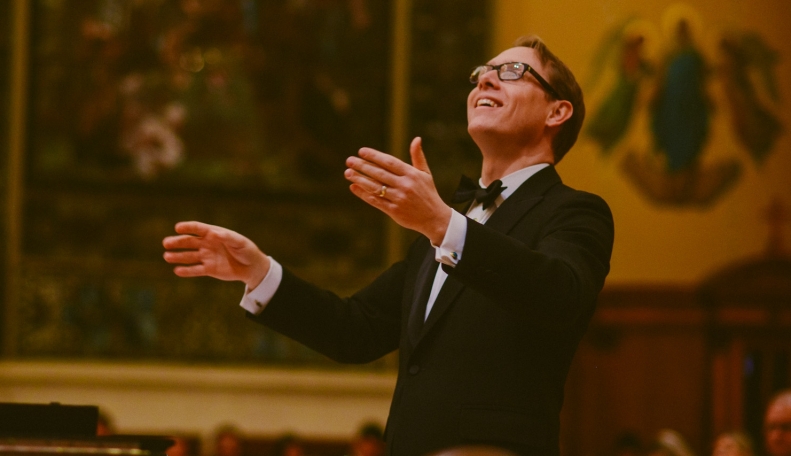About
Music
Praise for Choral Director Andrew Lewis

CHORAL DIRECTOR SEEKS TO EXPAND YET STAY TRUE
—John von Rhein, Chicago Tribune, Sep 5, 2014
With choral groups of every size, description and professional status vying for attention in and around Chicago, standing out from the pack often depends on how distinctive a niche each is able to carve out for itself.
The Chicago-based chamber chorus Bella Voce is doing so as much through thoughtfully focused repertory as the vital, stylish way in which it performs that repertory. Its 2014–15 season of five programs promises to be a watershed for the group—no little thanks to Andrew Lewis, the inspiring conductor, scholar and educator who’s beginning his 10th season as artistic director.
You would expect a choral ensemble whose name, in Italian, means “beautiful voice” to have in its ranks singers with pleasing, well-trained voices and superior musicianship—and it does, up to 24 choristers, the number varying according to the requirements of each program.
Even so, turning a two dozen or so good singers into a superior chorus involves many factors, not least a joint willingness to embrace the music with heart and soul, and a director who’s able to shape and refine that music with an exacting regard for the composers’ intentions and for direct communication to the listener. Lewis has that knack, and he guards the artistic integrity of Bella Voce like a fiercely protective mother hen. Part of that involves being choosy about the kind of singer he will admit into the ranks of a choir he once sang in, in its original incarnation as His Majestie’s Clerkes.
Not every voice type or vocal approach, he explains, is appropriate for the specialized repertory with which the group is identified—polyphony from the English Tudor period and contemporary choral repertory by composers who are carrying the Tudor manner and aesthetic into the late 20th and early 21st centuries. “Personnel is probably my most important job, because that sets the stage for the sound of the group,” says Lewis, who also serves as music director of the Elgin Master Singers and is an adjunct lecturer at the University of Illinois at Chicago.
“I want people in the group that can sing naturally, in Bella Voce style,” he says. “We sing with vibrato, but I like singers that can take vibrato away and put it back in with ease and flexibility—it’s a specific technique for those singers who can do that. Once I find that kind of singer, I do my damnedest to make sure they’re happy and they want to stay in the group, because every one of them is really integral to our success. That’s what Bella Voce has been for a long time.
“And while I am an important part of that, it’s really a group effort—a vision everyone tries to attain, everyone facing in the same musical direction.”
Founded in 1982 and renamed in 2001 to reflect the more diverse repertory the choir had come to embrace under longtime artistic director Anne Heider, Bella Voce has enriched the local choral performance scene with everything from large sacred masses by Palestrina and Des Prez to Renaissance and Baroque motets, to choral polyphony by Eric Whitacre, James MacMillan and other contemporary composers whose music bridges past and present traditions
The 2014–15 Bella Voce season is a direct reflection of Lewis’ musical sensibility.
The season-opening concerts in October juxtapose Anglican church works by William Byrd and Thomas Tallis with choral pieces by Herbert Howells, William Walton and the late John Tavener that adhere to the English cathedral tradition.
November will bring the choir’s annual collaboration with Chicago’s Callipygian Players in Handel’s “Messiah,” a Christmastide tradition that will mark the area’s only complete period-instrument performances of the beloved oratorio this season.
Concerts in March will mark the return of Bella Voce Camerata, the one-voice-per-part chamber choir Lewis created earlier this year. The program will contrast Baroque and modern settings of the “Stabat Mater” text by Giovanni Pergolesi and Arvo Part.
The not-for-profit Bella Voce operates on a modest budget of about $100,000 that draws on support from the choir’s seven-member board and grants from the Elizabeth F. Cheney Foundation, Illinois Arts Council and other sources.
Revenue-sharing partnerships with the Callipygian ensemble and donated services from the School of Theater and Music of the University of Illinois at Chicago (where Bella Voce is an ensemble in residence) help defray expenses and allow Lewis to realize ambitious projects such as the Bella Voce Camerata performances of David Lang’s “The Little Match Girl Passion” here last March.
Deepening the choir’s exploration of its signature repertory is key to the director’s objectives for future seasons.
“There is an enormous number of great Renaissance Masses I’d like to explore,” Lewis says. On the opposite end of the historical spectrum, he adds, “There is so much amazing new music being written by the English composers Gabriel Jackson and Tarik O’Regan, also the Welshman Paul Mealor, that I’d really like to do. I think Bella Voce can continue to expand its niche while staying absolutely true to its core identity. We are not going to change who we are based on who else is in the marketplace. We are going to be ourselves.”
Bella Voce will begin its 2014–15 season with “FaireIs the Heaven,” old and new choral music grounded in the English cathedral tradition. Concerts are Oct. 18 at Grace Lutheran Church, 7300 Division St., River Forest; and Oct. 19 at St. Luke’s Episcopal Church, 939 Hinman Ave., Evanston; $30–$38, $15 students; 877-755-6277, bellavoce.org.



